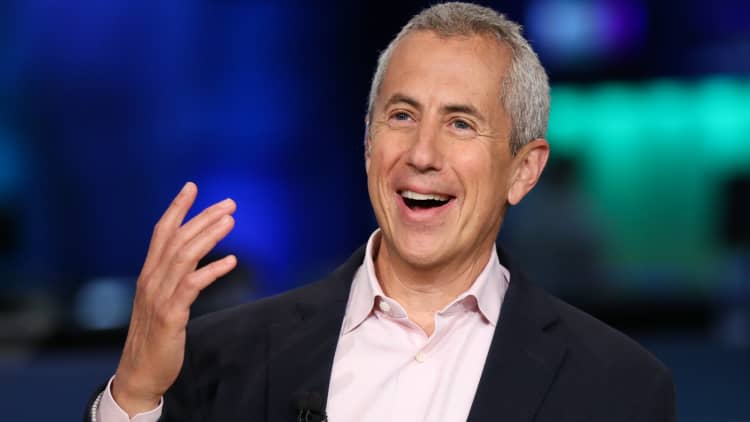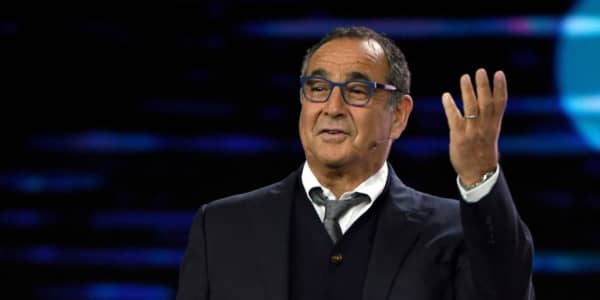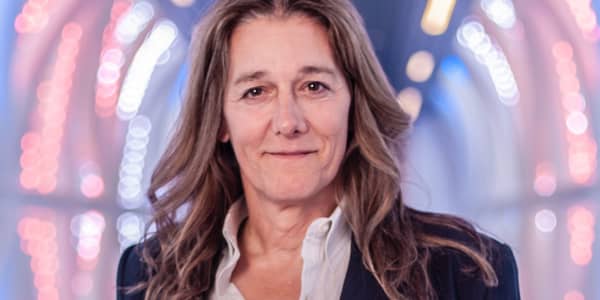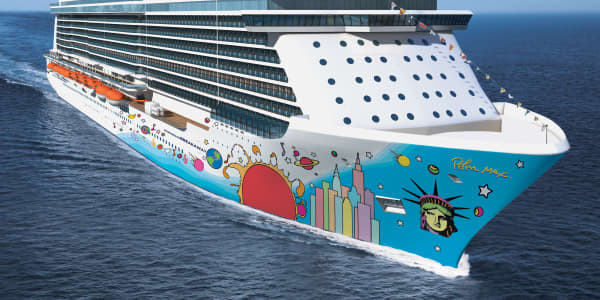
New York City restaurateur Danny Meyer is one of the most powerful people in the food-service industry. But he didn't get there without questioning some long-established rules and taking some huge risks. In fact, he says, some of his greatest achievements evolved from breaking tradition.
His first bold move: telling his parents in the early '80s that he was going to "be a restaurant guy" and not a lawyer.
Since then, he has not slowed down. Throughout Meyer's 34-year career, he has revolutionized the restaurant industry, banning smoking at Union Square Cafe 12 years before it became law, eliminating tipping, offering a paid four-week parental leave policy and having "feeling" be his guiding principle within the walls of his eateries.
But he admits that being a trailblazer hasn't always been easy. After Meyer announced in 2016 that he was moving to a gratuity-included business model, about 40 percent of his longtime front-of-house staffers left the company. It also provoked a diner to file a lawsuit against Meyer and several other top New York restaurateurs, alleging that these "restaurant owners are engaged in a sophisticated unlawful conspiracy to put that money into their own pockets" and that Meyer "spearheaded" it all.
The suit was quickly dismissed, and no-tipping policies have increased in recent years.
"The fact is, most of our customers have said thank you for doing that. [They said], 'We don't want to have to calculate tips at the end of the meal. We don't want to have to wonder throughout the entire meal, Are you only being nice to me in hopes that I'll take out an extra 20 to 25 percent at the end of the meal?'"
He adds, "You're going to have to be an idiot not to question yourself along the way, because if it was that obvious and that easy, others would have done it already ahead of you. But I've never asked or second-guessed the reasons for which we did this, which was to professionalize an industry."
So it's quite surprising to hear that the founder and CEO of Union Square Hospitality Group — who founded Shake Shack and now heads some of New York's most acclaimed restaurants, cafes and bars, including Gramercy Tavern, The Modern Maialino — was once fearful to expand.
"I didn't want to go bankrupt like my dad had gone bankrupt, and I always associated his business bankruptcy—in the travel business, in his case—with having expanded, and obviously there are thousands and thousands of businesses who have expanded. Expansion itself is not the reason you go bankrupt, and I didn't know enough about business to understand."
What Meyer did know, ever since he opened the doors to his first restaurant, Union Square Cafe, in 1985, is how to make people feel good. Throughout his 34-year career, hospitality has been key to his success. "No matter what the industry, the way you make people feel is the most telling factor in who's going to want to work for you. And who wants to work for you is the most telling factor in how good is your business."
Meyer's USHG empire now extends beyond the walls of its eateries, offering operational consulting and a multifaceted catering and events business called Union Square Events, which operates in New York, Las Vegas and Washington, D.C.
A chance meeting and a little luck
As a 27-year-old running his first restaurant, Meyer admits he had a lot to learn. "It was not a hit right off the bat," he said. "The first month and a half was bleak enough and slow enough that I was giving subsidies to certain servers and bartenders and cooks on our team to make sure they would stay, even though they were not making all that much money."
But a short time later New York Times restaurant critic Bryan Miller — whom Meyer happened to have known before Miller worked for the Times—gave the café a two-star rating, and that put the restaurant on the map. "We went from 0 to 60 overnight," Meyer said.
Yet nearly a decade later Meyer still struggled with the notion of expanding. "When my dad died, which was five years after Union Square Cafe opened, in an interesting way, it put me in a position where I had to come to grips with, 'I'm not my dad; I can expand someday.'"
Then a chance meeting with a young, gifted chef named Tom Colicchio — who later opened the Craft Line of restaurants and co-hosted the reality show Top Chef — encouraged Meyer to finally take the leap. "I met Tom at an event for Share Our Strength that I was actually organizing to help fight hunger, and Tom's restaurant was about to close—it was about to go out of business—and Tom said, 'I want to do a restaurant with you.'"
Meyer says that meeting, and the realization, finally, that his future could be different from his father's, was the defining moment that shaped his career. "Those two things together put me in a position where I said, 'You know what? It's time. I'm going to do it.' … It was a really powerful moment going from one to two restaurants."
Shortly after, the duo opened Gramercy Tavern, and from there Meyer continued opening a number of fine-dining establishments across New York. Yet in 2004 Meyer was faced with perhaps his biggest challenge: going from fine dining to fine burgers in a roadside setting.
From fine dining to fine casual
According to Meyer, Shake Shack was born out of a commitment to the community and the need to encourage people to visit the Madison Square Park Conservancy. "Shake Shack only happened because we fell in love with parks. We had fallen in love with Union Square Park, and we'd fallen in love with Madison Square Park," he said.
Shake Shack only happened because we fell in love with parks.Danny Meyerfounder, Union Square Hospitality Group
Starting out as a hot dog cart inside Madison Square Park in 2001, Shake Shack evolved into a stand within the park three years later, expanding its menu to include hamburgers, fries and milkshakes. Meyers refers to Shake Shack as fine casual because he uses the same quality ingredients in his restaurant that he uses in his burgers. The concept exploded: Shake Shack went public in 2014 and pulls in about $445 million in revenues annually.
Still, Meyer says, "I think Shake Shack took about five years for us to figure it out." In 2012 Meyer stepped down as CEO and USHG's then director of operations, Randy Garutti, started running the day-to-day operations.
Looking back, Meyer says he often wonders how things would have turned out if it had not been for Miller, the New York Times restaurant critic, back in 1985. "I always had a sense that maybe the only reason Union Square Café had been successful for those 10 years was because I had known the restaurant critic before opening the restaurant, which is crazy.
Each time something works, I say, 'Why did it work? How much of that was luck?' There's luck in everything you do, and just to try to prove it to myself, [I think] that if we somehow climb that mountain, could we potentially climb one that's a little steeper or a little bit higher — that continues to motivate me to this day."






